Abstract
Sorbitol is a hexahydroxy alcohol used as a sugar substitute in many dietetic foods and as a drug vehicle. Previous studies have suggested that sorbitol ingestion may be an additional cause of non-specific gastrointestinal distress. We evaluated sorbitol malabsorption in 30 healthy volunteers, seven patients with untreated coeliac disease and nine patients with coeliac disease on a gluten free diet, using a four hour H2 breath test. After ingestion of test solutions containing sorbitol 10 and 20 g and of four sweets (6.8 g sorbitol), 90%, 100%, and 62% of healthy volunteers, respectively had significantly raised H2 excretion, indicating malabsorption of sorbitol. Of all healthy subjects tested, 45% after 10 g, 100% after 20 g, and 50% after four sweets complained of symptoms of carbohydrate intolerance during the eight hours after sorbitol. After a 5 g dose given at concentrations of 2%, 4%, 8%, 16%, malabsorption was shown in 10%, 12%, 22%, and 43% of the healthy volunteers. Symptoms of intolerance at 5 g were experienced only at concentrations of 8% and 16%. Unlike healthy volunteers and coeliac patients on a gluten free diet, 100% of untreated coeliacs malabsorbed a 2% solution of 5 g sorbitol. These results show that malabsorption and intolerance of sorbitol may result from ingestion of doses and/or concentrations usually found in many foods and drugs; they underline the need to consider this as a possible and hitherto underestimated cause of gastrointestinal symptoms.
Full text
PDF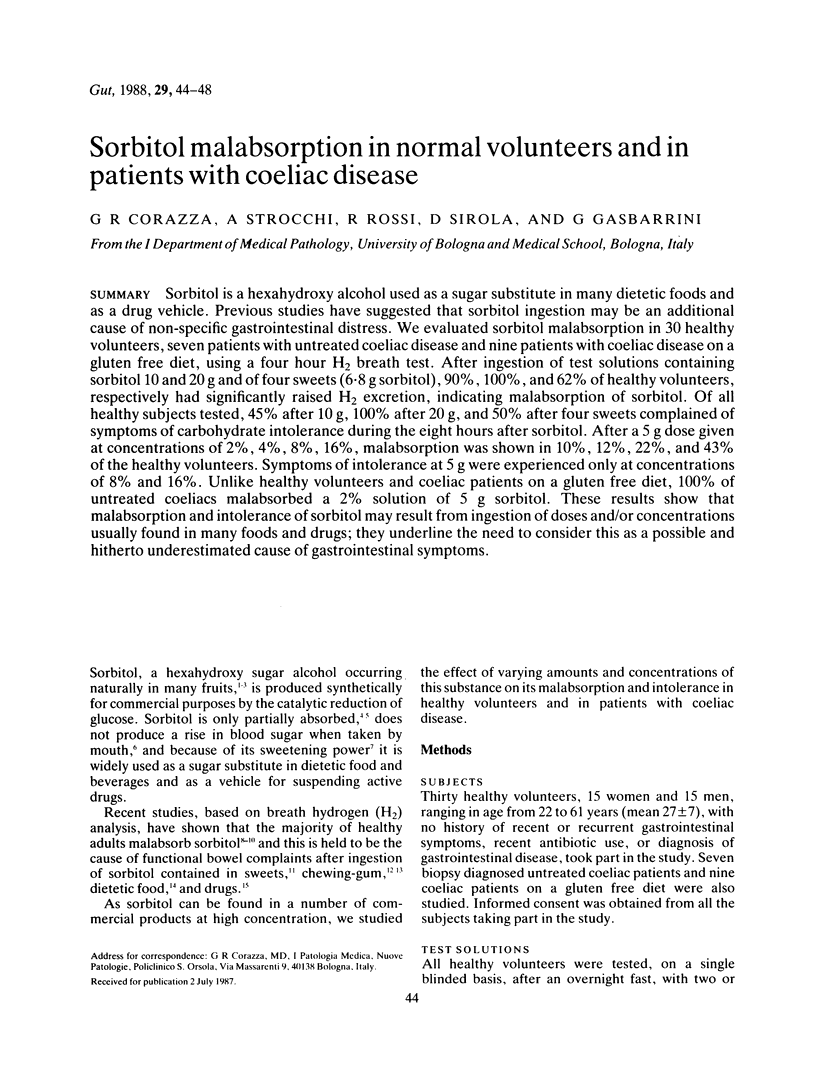
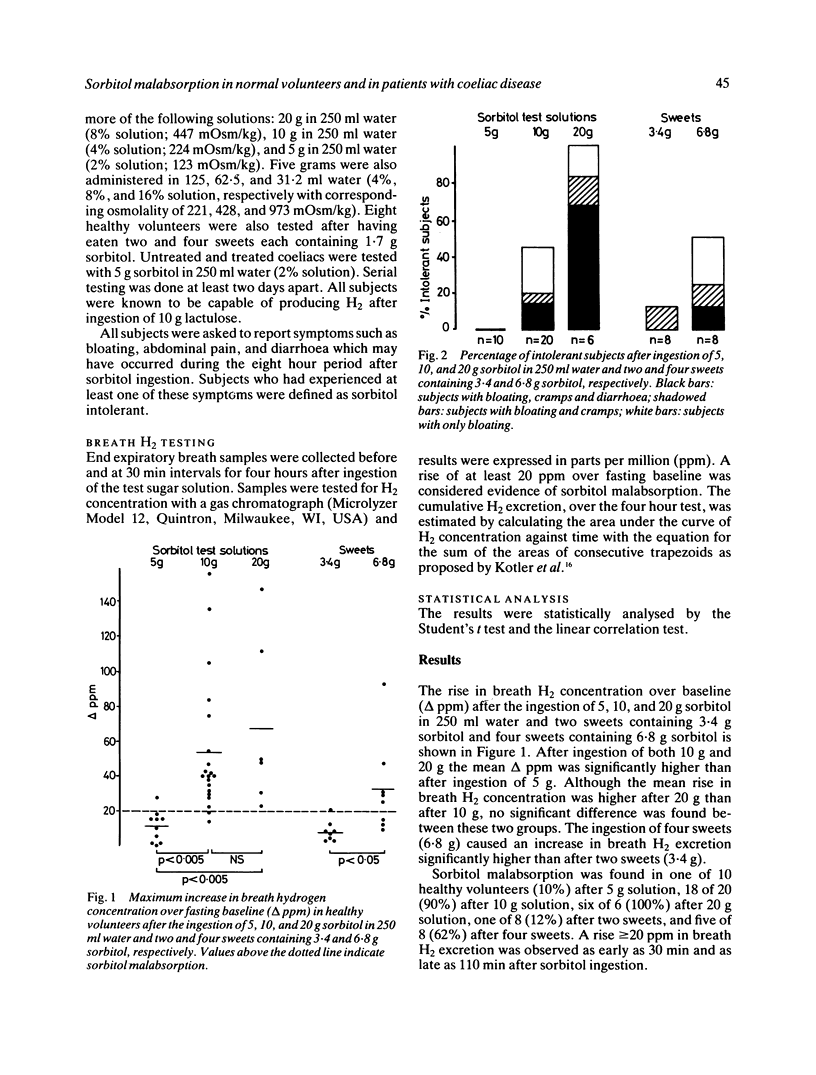
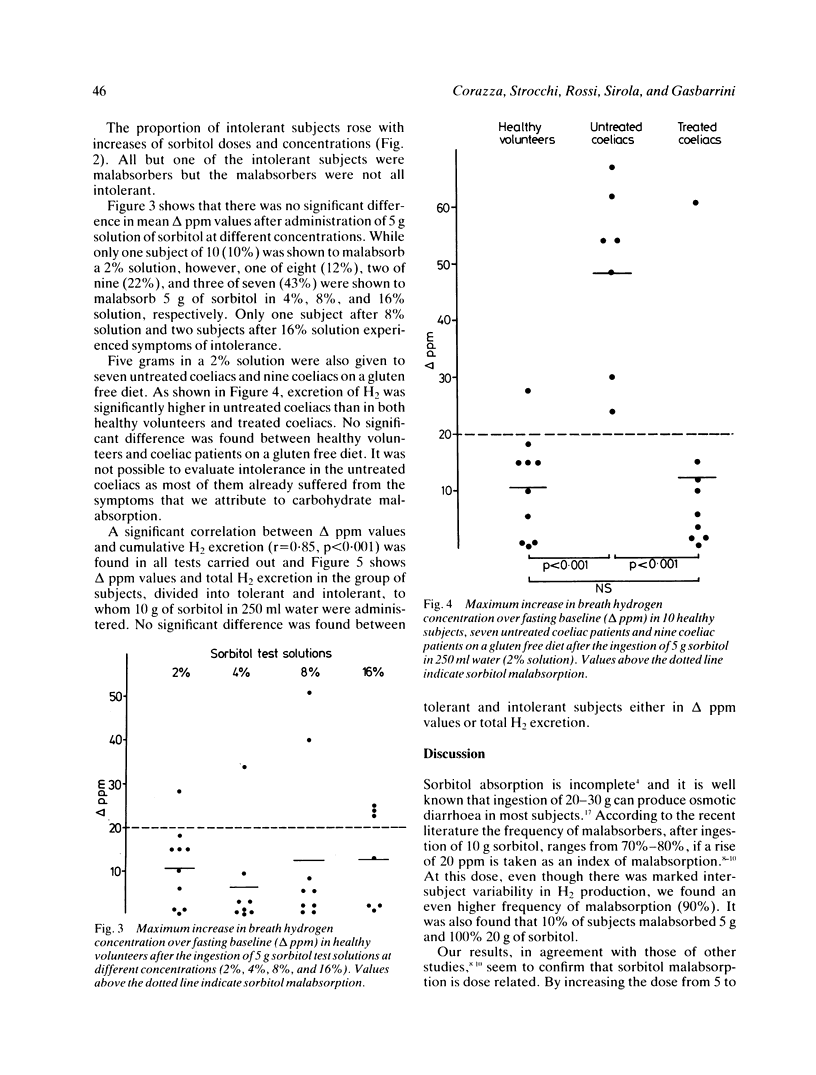
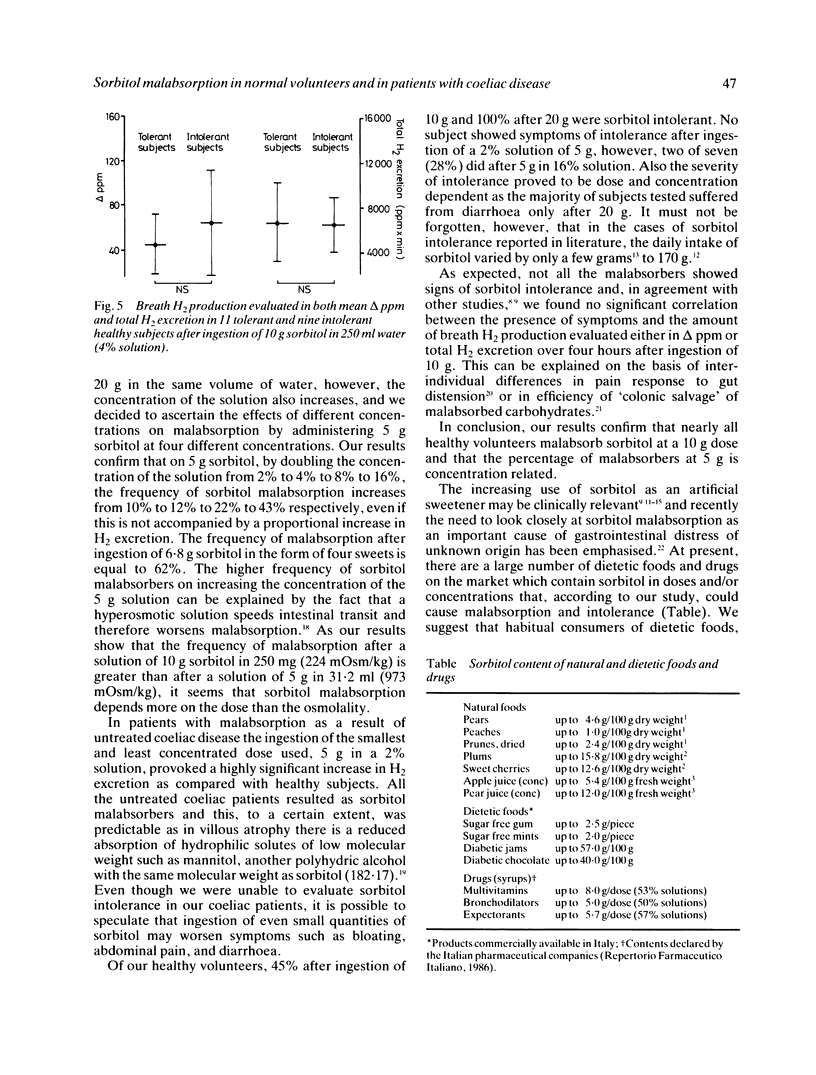
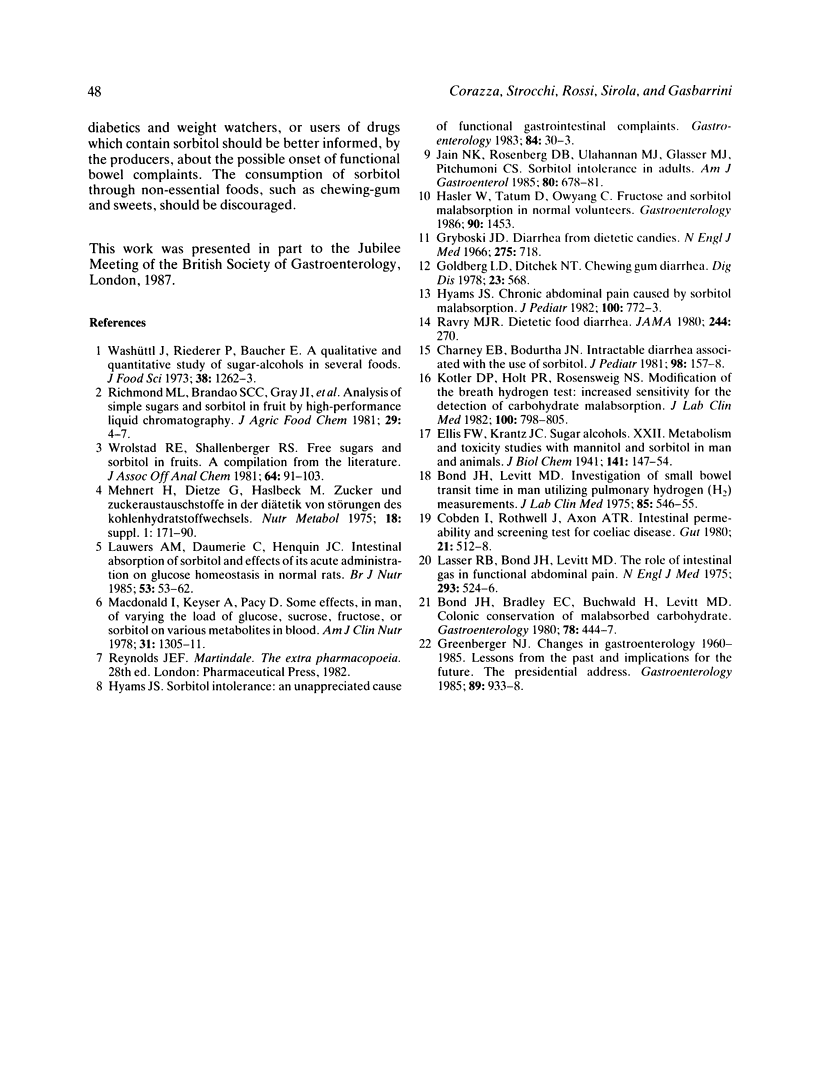
Selected References
These references are in PubMed. This may not be the complete list of references from this article.
- Bond J. H., Currier B. E., Buchwald H., Levitt M. D. Colonic conservation of malabsorbed carbohydrate. Gastroenterology. 1980 Mar;78(3):444–447. [PubMed] [Google Scholar]
- Bond J. H., Jr, Levitt M. D., Prentiss R. Investigation of small bowel transit time in man utilizing pulmonary hydrogen (H2) measurements. J Lab Clin Med. 1975 Apr;85(4):546–555. [PubMed] [Google Scholar]
- Charney E. B., Bodurtha J. N. Brief clinical and laboratory observations. J Pediatr. 1981 Jan;98(1):157–158. doi: 10.1016/s0022-3476(81)80563-x. [DOI] [PubMed] [Google Scholar]
- Cobden I., Rothwell J., Axon A. T. Intestinal permeability and screening tests for coeliac disease. Gut. 1980 Jun;21(6):512–518. doi: 10.1136/gut.21.6.512. [DOI] [PMC free article] [PubMed] [Google Scholar]
- Goldberg L. D., Ditchek N. T. Chewing gum diarrhea. Am J Dig Dis. 1978 Jun;23(6):568–568. doi: 10.1007/BF01072704. [DOI] [PubMed] [Google Scholar]
- Greenberger N. J. Changes in gastroenterology 1960-1985: lessons from the past and implications for the future. Gastroenterology. 1985 Nov;89(5):933–938. doi: 10.1016/0016-5085(85)90191-x. [DOI] [PubMed] [Google Scholar]
- Gryboski J. D. Diarrhea from dietetic candies. N Engl J Med. 1966 Sep 29;275(13):718–718. doi: 10.1056/NEJM196609292751309. [DOI] [PubMed] [Google Scholar]
- Hyams J. S. Chronic abdominal pain caused by sorbitol malabsorption. J Pediatr. 1982 May;100(5):772–773. doi: 10.1016/s0022-3476(82)80586-6. [DOI] [PubMed] [Google Scholar]
- Hyams J. S. Sorbitol intolerance: an unappreciated cause of functional gastrointestinal complaints. Gastroenterology. 1983 Jan;84(1):30–33. [PubMed] [Google Scholar]
- Jain N. K., Rosenberg D. B., Ulahannan M. J., Glasser M. J., Pitchumoni C. S. Sorbitol intolerance in adults. Am J Gastroenterol. 1985 Sep;80(9):678–681. [PubMed] [Google Scholar]
- Kotler D. P., Holt P. R., Rosensweig N. S. Modification of the breath hydrogen test: increased sensitivity for the detection of carbohydrate malabsorption. J Lab Clin Med. 1982 Nov;100(5):798–805. [PubMed] [Google Scholar]
- Lasser R. B., Bond J. H., Levitt M. D. The role of intestinal gas in functional abdominal pain. N Engl J Med. 1975 Sep 11;293(11):524–526. doi: 10.1056/NEJM197509112931103. [DOI] [PubMed] [Google Scholar]
- Lauwers A. M., Daumerie C., Henquin J. C. Intestinal absorption of sorbitol and effects of its acute administration on glucose homeostasis in normal rats. Br J Nutr. 1985 Jul;54(1):53–62. doi: 10.1079/bjn19850092. [DOI] [PubMed] [Google Scholar]
- Macdonald I., Keyser A., Pacy D. Some effects, in man, of varying the load of glucose, sucrose, fructose, or sorbitol on various metabolites in blood. Am J Clin Nutr. 1978 Aug;31(8):1305–1311. doi: 10.1093/ajcn/31.8.1305. [DOI] [PubMed] [Google Scholar]
- Mehnert H., Dietze G., Haslbeck M. Zucker und Zuckeraustauschstoffe in der Diätetik von Störungen des Kohlenhydratstoffwechsels. Nutr Metab. 1975;18 (Suppl 1):171–190. [PubMed] [Google Scholar]
- Ravry M. J. Dietetic food diarrhea. JAMA. 1980 Jul 18;244(3):270–270. doi: 10.1001/jama.1980.03310030046027. [DOI] [PubMed] [Google Scholar]
- Richmond M. L., Brandao S. C., Gray J. I., Markakis P., Stine C. M. Analysis of simple sugars and sorbitol in fruit by high-performance liquid chromatography. J Agric Food Chem. 1981 Jan-Feb;29(1):4–7. doi: 10.1021/jf00103a002. [DOI] [PubMed] [Google Scholar]
- Wrolstad R. E., Shallenberger R. S. Free sugars and sorbitol in fruits--a complication from the literature. J Assoc Off Anal Chem. 1981 Jan;64(1):91–103. [PubMed] [Google Scholar]


